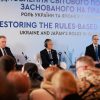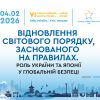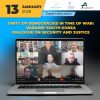From January 12 to 18, 2023, the New Europe Center in partnership with the International Center for Ukrainian Victory (ICUV), conducted an advocacy visit to Japan in connection with the start of Japan’s G7 presidency.
“It was crucially important for us to make an advocacy visit to Japan at the beginning of Japan’s G7 presidency in order to set the right tone in the issues that affect Ukraine in one way or another,” said Alyona Getmanchuk, Director of the New Europe Center, explaining the goals of the visit.
The Ukrainian delegation included Alyona Getmanchuk, director of the New Europe Center; Leo Litra, Senior Research Fellow at the New Europe Center; Olena Halushka, Co-Founder of the International Center for Ukrainian Victory (ICUV) and Board Member of the All-Ukrainian NGO Anti-Corruption Action Center; Hanna Hopko, Co-Founder of the International Center for Ukrainian Victory (ICUV) and former chairwoman of the Verkhovna Rada Committee on Foreign Affairs; Maria Kurinna, human rights activist.
Day 1:
The Ukrainian delegation met with Ambassador Extraordinary and Plenipotentiary of Ukraine to Japan Sergiy Korsunsky.
Day 2:
The experts met and talked to the Director General for International Cooperation at the Ministry of Defense about military cooperation between Ukraine and Japan.
“We are talking about how not to limit military cooperation despite all the restrictions in Japan,” said Alyona Getmanchuk.
Day 3:
The experts visited the city of Hiroshima, where the Group of Seven summit will be held as part of Japan’s G7 presidency. During the visit, the experts talked to journalists from the most popular Japanese newspaper about Japan’s leadership in the issue of terrorism and nuclear blackmail by Russia.
“For me personally, the return to Hiroshima took place after a break of 20 years and in a completely new context, actualized by the great war. An emotionally very difficult excursion to the Hiroshima Peace Memorial Park… Conversations with journalists from the most popular Japanese newspaper, who are reporting on our visit to Hiroshima, what highlight that Japan should take the lead in responding firmly to all attempts of nuclear terrorism and nuclear blackmail by the Russian Federation. Moreover, the current Japanese Prime Minister Kishida is from Hiroshima. We emphasized how important it is for Zelensky to take part in the Hiroshima summit, if the situation at the front allows, and not online,” Alyona Getmanchuk said.
Day 5:
The experts spoke at a roundtable discussion in the Japanese Parliament, co-organized by the New Europe Center. In the speech, Alyona Getmanchuk emphasized that “no country in the world is as interested in ending the war and peace as Ukraine, but sustainable peace is possible only if Ukraine wins.”
“That is why now we need to invest all efforts in a quick victory – primarily through military support, but also financial support and increased sanctions pressure on Russia,” said Getmanchuk.
Leo Litra, Senior Research Fellow at NEC, emphasized how important it is that those countries that are really helping Ukraine win the war, and not just expressing concern about the “Ukrainian crisis”, participate in the reconstruction process. He also spoke about the importance of Ukraine’s accession to the EU for the reconstruction process to be as transparent as possible.
Day 6:
On this day, the experts met with:
- representatives of three large Japanese companies interested in rebuilding Ukraine;
- high-ranking government officials, including Nakagome Masashi, Director General for European Affairs at the Ministry of Foreign Affairs, and Gen Nakatani, Special Advisor to the Prime Minister;
- leading Japanese experts.
Day 7:
On this day, the Ukrainian delegation:
- took part in a roundtable discussion with high-ranking representatives of the “Kōmeitō” political party, which is part of the ruling coalition;
- met with Japan’s Deputy Minister for Digital Policy Akaishi Koichi;
- met and took part in a discussion with the leadership of the leading news agency “JiJi”, in a working lunch with the Japanese development agency, and a press conference at the National Press Club, where more than 70 Japanese journalists gathered.




























